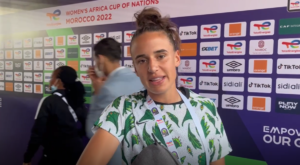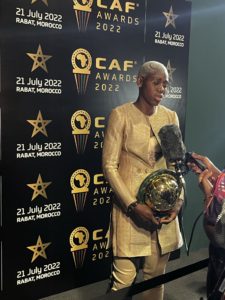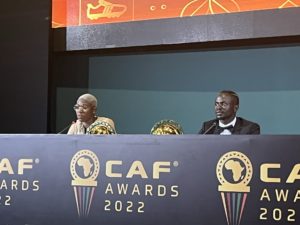Opinion: the biggest skill missing from the WAFCON is media training

“Just wait, let me check with coach if I can speak with you, he said we are not allowed to speak to media,” Falone Sumaili told me in the mix zone after Burundi’s second group stage match at the Women’s Africa Cup of Nations. Myself and the two other journalists in the mix zone turned to each other in shock and confusion.
Gustave Niyonkuru no doubt has his reasons for stopping his players from speaking to the media, but failing to let his players speak to journalists will do nothing but hurt their careers. Burundi are the smallest and most unknown team at the tournament, they are also the only team that did not have a single journalist from their country present at the tournament.
The Swallows are not guaranteed to ever qualify for another WAFCON, and so these opportunities to be interviewed could be the only chance some of these players have to get their names out and get moves.
Niyonkuru was not alone in his naïve approach to dealing with journalists. For a tournament that is so small and in need of media attention, getting access to players and staff was extremely difficult. It was perhaps the biggest skill missing from a tournament that displayed the prodigious on-field talent of African footballers, media skills.

On a continent where TV coverage of women’s football is so sparse, agents, scouts and clubs rely on reporting of players far more than they do in other spheres of football where data and analytics have become so prevalent.
The WAFCON represents for some players the only opportunity in their careers to have scouts see them play up close or have full access to quality tv footage of them. That fact was not lost on players. Nearly every player I interviewed, particularly those from smaller nations, spoke about how important the tournament was for them to get a move to a bigger club or nation. But the WAFCON also is the only chance where players can have global media attention on them and their chance to get their name out there.
It is easy to overinflate one’s value as a journalist, something we are all guilty of in the media industry, but I have been struck by how important the role of journalists are in the ecosystem of women’s football transfers.
One colleague told me that he is regularly contacted by clubs in Europe asking for analysis of certain players, or even to suggest a player. They mentioned that on one occasion they even facilitated a couple players going to Spain for trails with some clubs.
In a world where experts, journalists, scouts and agents are more rare, people end up playing more than one role. And so players, coaches, clubs and nations building those relationships are all the more important. Because of the sparse media attention, those media actors play a far bigger role in how the players and coaches are represented.
For instance, when I was covering the World Cup playoff match between Cameroon and Botswana, we attended the post-match press conference as normal. We spoke first to Ajara Njoya the Cameroonian player of the match, followed by the two coaches.
But by the time we had finished the press conference and gone to the mix zone to get quotes, the Cameroonian team had already left. Because of this, despite Cameroon winning the match and qualifying for the World Cup, all of the international media covering the match focused on Botswana. I was able to get exclusive quotes from Botswana head coach Gaoletlhoo Nkutlwisang and so my quotes led piece the following day was all about her and Botswana’s experience at the WAFCON.
The Women’s game in Africa has improved rapidly over the last four years since the last WAFCON in 2018. The football has improved on the pitch and many nations are increasingly becoming professional, both in their financial status as well as the way they are coached. But for the majority of teams, that professionalism has not extended to the way teams manage their relationship with the media.

Not all teams have been so poor, and individuals who understand the necessary evil of journalists are those whose reputations have been enhanced by the tournament. It may be coincidence, but the two finalists are coached by managers who have built the best relationship with the media.
Reynald Pedros, coming from the most professional environment in women’s football in Lyon, has made himself immensely popular in Morocco, not simply by his team’s success on the pitch.
Desiree has had to fight much harder to win over the media in South Africa, with people criticising her decisions on the verge of the tournament. But she has made her constantly available for interviews and speaks eloquently with humour in press conferences, making her immensely popular and well spoken of around the continent.
Nkutlwisang has enhanced her reputation, beyond coaching Botswana to a quarter-final. Her intense persona, punctuated by humour left her being questioned at the end of her tournament about if she would be receiving offers to coach abroad.
Like football skills, talent when speaking to media is something that comes natural to some and not to others. But like football skills, it also is something that can be trained and developed. It is perhaps the biggest skill that is missing from women’s football institutions in Africa.
Individuals cannot be simply blamed for this either. For many this exposure is entirely new and with the WAFCON receiving more international attention than ever before, it is steep learning curve. But learning to not only tolerate the media, but to actually use us a tool to further their careers’ is one of the most vital skills that countries need to develop for the future.